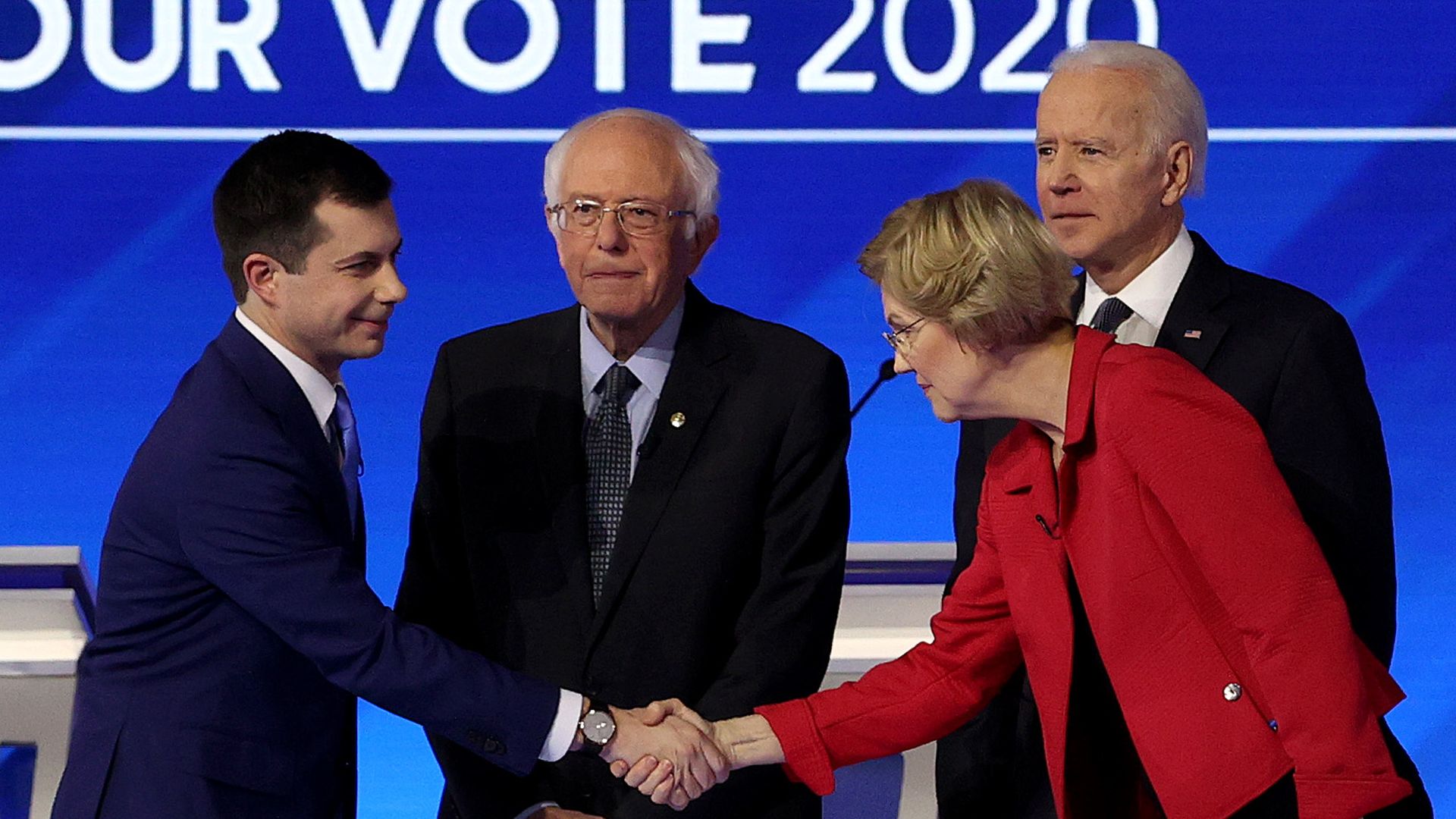4 key takeaways from the Democratic debate in New Hampshire
Add Axios as your preferred source to
see more of our stories on Google.

Photo: Win McNamee/Getty Images
The attacks grew more direct and the fault lines more defined Friday night at the eighth Democratic debate, as candidates looked to either capitalize on their Iowa momentum or stop the bleeding four days before New Hampshire primary.
Why it matters: Pete Buttigieg has the chance to make a huge statement if he can pull off a victory in New Hampshire, a state that his fellow Iowa frontrunner Bernie Sanders won in a landslide in 2016. Joe Biden, meanwhile, seemed ready to concede at the outset of the debate: "I took a hit in Iowa, and I’ll probably take one here."
1. Impeachment fallout: This was the first debate since the 2020 nominating contests began with the Iowa caucuses and the first since the Senate acquitted President Trump at his impeachment trial.
- Buttigieg defended Joe Biden against the threat of congressional investigation by Republicans, calling it an attempt to deflect from Trump's misconduct: "To be the kind of human being who would seek to weaponize a son against his own father is an unbelievably dishonorable thing."
- Biden thanked Buttigieg and pivoted to Trump's retaliation against impeachment witnesses. "He should be pinning a medal on [Lt. Col Alexander] Vindman, and not on Rush Limbaugh," Biden said, before calling on the audience to give Vindman a standing ovation.
- Sen. Amy Klobuchar recognized Sen. Mitt Romney for being the sole Republican to vote to convict Trump. Praise for the 2012 Republican nominee at a Democratic debate until this past week would have been unthinkable.
2. Electability beyond early states: Buttigieg may have a narrow delegate edge from Iowa, but his campaign faces an existential threat beyond New Hampshire due to his lack of support among people of color.
- The former mayor continued to make the case for being a "unity" candidate, and his campaign later tweeted out the video of him defending Biden — a possible forward-looking attempt to court moderate voters and donors in case Biden's campaign fizzles out.
- Sanders, meanwhile, was pushed on whether his "democratic socialism" could appeal to a general electorate, as Biden ramped up attacks about how the label could affect other candidates down-ballot. Sanders argued: "The way you bring people together is by presenting an agenda that works for the working people of this country — not for the billionaire class."
3. Foreign policy: Several candidates were asked whether they would have ordered the strike that killed Iranian Gen. Qasem Soleimani. Buttigieg answered that it would depend on the circumstances, while Biden flatly said no.
- Sanders argued that there are plenty of malign government officials in the world, but "you can't go around saying, you're a bad guy, we're going to assassinate you."
- The Trump campaign will undoubtedly weaponize the Soleimani responses to attack the candidates. The operation was heavily criticized by many Democrats, but polling shows a slim majority of Americans ultimately approved of it.
4. Fighting to survive: Sens. Elizabeth Warren, who represents neighboring Massachusetts, needs a strong showing in New Hampshire for her campaign to continue. Like Buttigieg, she has pitched herself as the "unity" candidate who can bridge the party's progressive and moderate wings, and she hammered on her anti-corruption message throughout the debate.
- Sen. Amy Klobuchar, the only other woman onstage, has consistently had strong debate performances that have failed to give her a boost at the polls. She spoke the fourth most out of any candidate and effectively made the case for a moderate nominee with more experience and electoral success than Buttigieg.
Bonus: Former New York Mayor Michael Bloomberg has yet to appear on the debate stage, but many of the his rivals for the White House weighed in on his candidacy.
- Warren: “I don’t think anybody ought to be able to buy their way into a nomination or to be president of the United States."
- Klobuchar: "I can't stand the big money in politics."
- Sanders: Being able to spend hundreds of millions on your ads is nonsense.
- Buttigieg: Says he's only person on stage not a millionaire or billionaire.
- Thought bubble from Axios' Managing Editor David Nather: Does that mean they don't want him to spend his money on them in the general election?
